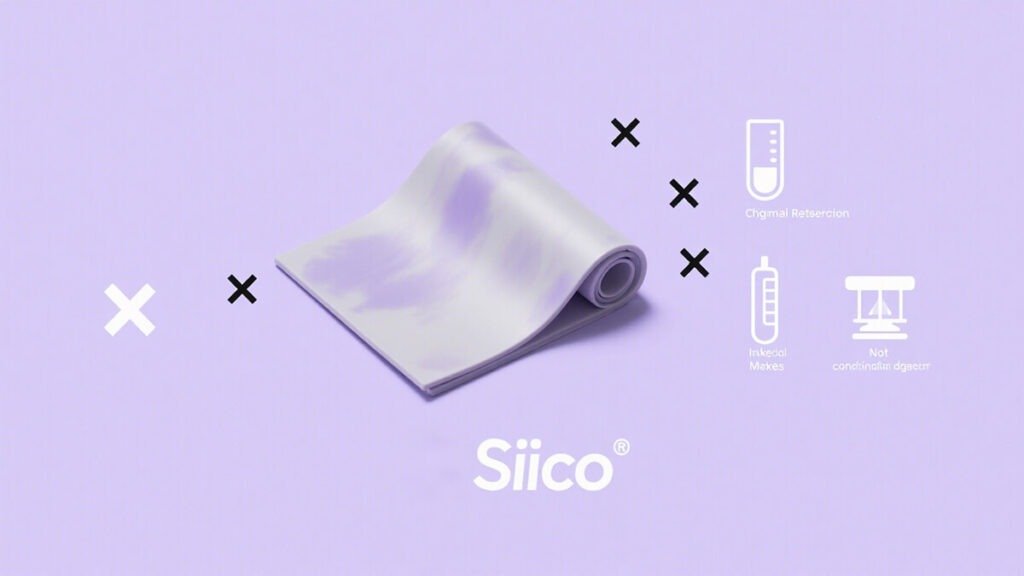How to Choose the Right Silicone Rubber?
- Blog
- December 11, 2023
- 10:46 am
Choosing the right silicone rubber is critical to product reliability, compliance, and manufacturing efficiency. This comprehensive guide explores key silicone rubber types—HTV, LSR, RTV, fluorosilicone, and medical-grade—alongside their properties, ideal use cases, and certification considerations.
Silico®, a trusted supplier of advanced silicone rubber materials, offers a full range of high-performance solutions engineered for precision molding, sealing, and medical applications. Whether you need liquid silicone rubber for injection molding, FDA-compliant medical-grade silicone, or high-temp silicone for automotive, this guide will help you make the right choice with Silico®.
Table of Contents
🔍 What Is Silicone Rubber?
Silicone rubber is an elastomer composed primarily of polysiloxane chains, known for its outstanding heat resistance, weatherability, flexibility, electrical insulation, and biocompatibility. These properties make it ideal for a wide range of sectors, including:
- Medical Devices
- Automotive Manufacturing
- Consumer Electronics
- Household Appliances
- Food Contact Materials
There are several types of silicone rubber, each suitable for different processing methods and applications:
| Silicone Type | Features | Typical Applications |
|---|---|---|
| HTV (High-Temperature Vulcanized) | High strength, extrusion /molding-friendly | Automotive gaskets, insulators, wires |
| LSR (Liquid Silicone Rubber) | Two-part injection molding, fully automated | Baby pacifiers, medical tubing, wearables |
| RTV-1 (One-part Room Temp Cure) | Easy application, cures at room temperature | Building sealants, glass bonding |
| RTV-2 (Two-part Room Temp Cure) | Precision casting, mold replication | Electronics potting, industrial molds |
| Fluoro silicone Rubber | Excellent chemical and oil resistance | Aerospace, fuel systems, oil seals |
| Conductive Silicone Rubber | Electrically conductive fillers included | EMI/RFI shielding, ESD protection, keypads |
| Flame Retardant Silicone | UL 94 V-0 grade available | Electrical enclosures, battery housing |
| Medical Grade Silicone | USP Class VI / ISO 10993 certified | Medical implants, syringes, surgical tubing |
⚙️ Key Factors in Selecting the Right Silicone Rubber
When choosing a silicone rubber material, it’s critical to assess the application environment, mechanical needs, and regulatory requirements. Here are the most important factors:
1. Operating Temperature Range
Silicone rubbers generally operate from -60°C to +300°C.
Use high-temperature silicone rubber for automotive engines and other extreme conditions.
2. Mechanical Performance
Tensile strength, elongation, tear resistance, and compression set are essential for parts like gaskets, O-rings, and seals.
3. Processing Method Compatibility
- Compression or transfer molding → HTV
- Injection molding → LSR (ideal for mass production)
- Coating or sealing → RTV-1
Encapsulation & potting → RTV-2
4. Electrical Insulation Properties
Choose silicone with high dielectric strength and volume resistivity for electronic devices or connectors.
5. Chemical Resistance or Functional Requirements
Fluorosilicone rubber is ideal for fuel resistance. For UV resistance or outdoor durability, use weatherproof silicone rubber.
6. Regulatory & Safety Compliance
Medical or food-grade applications require compliance with:- FDA 21 CFR 177.2600
- ISO 10993 / USP Class VI
- RoHS, REACH, UL 94 V-0
🧪 Industry-Specific Application Examples
✅ Medical Devices
Medical-grade LSR silicone is used for injection-molded products like catheters, oxygen masks, and baby teething rings. It must meet biocompatibility and sterilization standards.
✅ Automotive & Transportation
HTV and fluorosilicone are widely used in engine gaskets, turbo hoses, and cable insulation due to their thermal stability and oil resistance.
✅ Electronics & Electrical Components
RTV-2 silicone is ideal for encapsulation, thermal conductivity, and waterproof sealing in power supplies, LED lighting, and connectors.
✅ Construction & Structural Sealants
Neutral cure RTV-1 silicone sealants are perfect for weatherproofing glass, stone, and aluminum curtain walls.
⚠️ Common Mistakes to Avoid

Using non-certified silicone rubber for medical or food applications
Choosing RTV for high-temperature or high-pressure environments
Selecting overly hard/soft durometer grades for seals or gaskets
Overlooking processing compatibility (e.g., trying to injection mold HTV)
💡 Expert Tips for Silicone Rubber Selection
Always request TDS (Technical Data Sheets) and compliance documents from suppliers
Clarify processing methods with your manufacturing partner
Use FDA-approved, ISO-certified grades for sensitive applications
Work with a trusted supplier who can provide custom compound options
🔚 Conclusion
Selecting the right silicone rubber is the key to developing safe, reliable, and regulation-compliant products. With Silico®’s full product line of HTV, LSR, RTV, fluorosilicone, and medical-grade silicones, you can confidently meet the demands of industries ranging from healthcare to automotive and electronics.
Popular Recommendations
Get a Catalog & Best Price
- Quick and helpful reply within 24 hours;
- Tailored solutions provided for your project;
- One-stop purchasing service.
TRENDING
Silico® ORGANOSILICON
- Address: Daiyue Industrial Area, Taian, Shandong, China
- Tel: +86-0538-5071566Tel: +86-0538-5071566


